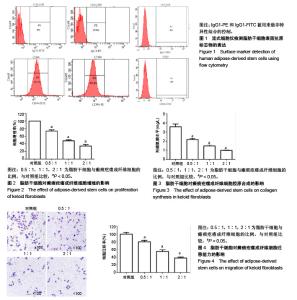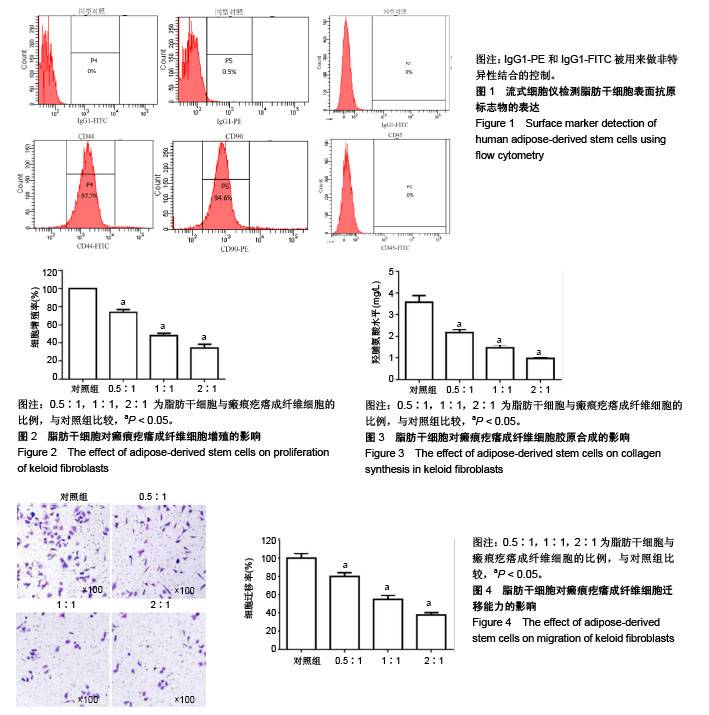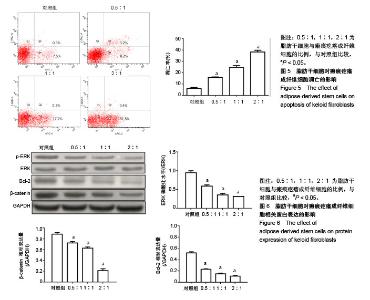Chinese Journal of Tissue Engineering Research ›› 2019, Vol. 23 ›› Issue (1): 61-67.doi: 10.3969/j.issn.2095-4344.0694
Previous Articles Next Articles
Molecular mechanism underlying the effect of adipose-derived stem cells on the proliferation of keloid fibroblasts
Li Xiang1, Wu Zhixian1, Liu Hongwei2, Liang Jie1, Mo Zizeng1
- 1Department of Plastic Surgery, Affiliated Hospital of Guangdong Medical University, Zhanjiang 524001, Guangdong Province, China; 2Department of Plastic Surgery, First Affiliated Hospital of Jinan University, Guangzhou 510630, Guangdong Province, China
-
Revised:2018-08-03Online:2019-01-08Published:2018-11-28 -
Contact:Liang Jie, Master, Professor, Master’s supervisor, Department of Plastic Surgery, First Affiliated Hospital of Jinan University, Guangzhou 510630, Guangdong Province, China -
About author:Li Xiang, MD, Attending physician, Department of Plastic Surgery, Affiliated Hospital of Guangdong Medical University, Zhanjiang 524001, Guangdong Province, China -
Supported by:the National Natural Science Foundation of China, No. 81372065 (to LHW)
CLC Number:
Cite this article
Li Xiang, Wu Zhixian, Liu Hongwei, Liang Jie, Mo Zizeng. Molecular mechanism underlying the effect of adipose-derived stem cells on the proliferation of keloid fibroblasts[J]. Chinese Journal of Tissue Engineering Research, 2019, 23(1): 61-67.
share this article
Add to citation manager EndNote|Reference Manager|ProCite|BibTeX|RefWorks

2.1 脂肪干细胞流式鉴定结果 通过流式细胞仪检测第3代脂肪来源干细胞的免疫表型:CD44和CD90的阳性率分别为97.7%和94.6%,CD45呈阴性表达,符合国际上对脂肪干细胞表面标志物的认定,见图1。通过酶消化法从脂肪组织中分离的细胞即为脂肪来源干细胞,而且培养至第3代具有脂肪干细胞特性,可用于其他相关实验研究。 2.2 脂肪干细胞对瘢痕疙瘩成纤维细胞增殖的影响 由图2可见,与对照组相比,脂肪干细胞与瘢痕疙瘩成纤维细胞共培养24 h后,瘢痕疙瘩成纤维细胞的增殖能力受到明显抑制(P < 0.05)。此外,随着共培养体系中脂肪干细胞比例的升高,脂肪干细胞对瘢痕疙瘩成纤维细胞的抑制作用逐渐增强(P < 0.05)。 2.3 脂肪来源干细胞对瘢痕疙瘩成纤维细胞胶原合成的影响 羟脯氨酸的含量能反映细胞或者组织中胶原蛋白合成情况。由图3可见,与对照组相比,脂肪来源干细胞与瘢痕疙瘩成纤维细胞共培养24 h后,瘢痕疙瘩成纤维细胞的胶原合成能力受到明显抑制(P < 0.05),并且随着共培养体系中脂肪干细胞比例的升高,脂肪干细胞对瘢痕疙瘩成纤维细胞胶原合成的抑制作用增强(P < 0.05)。 2.4 脂肪来源干细胞对瘢痕疙瘩成纤维细胞迁移能力的影响 与对照组相比,脂肪来源干细胞与瘢痕疙瘩成纤维细胞共培养24 h后,瘢痕疙瘩成纤维细胞的迁移能力受到明显抑制(P < 0.05),并且随着共培养体系中脂肪干细胞比例的升高,脂肪干细胞对瘢痕疙瘩成纤维细胞迁移的抑制作用增强(P < 0.05),见图4。 2.5 脂肪来源干细胞对瘢痕疙瘩成纤维细胞凋亡的影响 与对照组相比,脂肪来源干细胞与瘢痕疙瘩成纤维细胞共培养24 h后,瘢痕疙瘩成纤维细胞凋亡率显著升高(P < 0.05),并且随着共培养体系中脂肪干细胞比例的升高,脂肪干细胞对瘢痕疙瘩成纤维细胞凋亡的促进作用增强(P < 0.05),见图5。 2.6 脂肪干细胞对瘢痕疙瘩成纤维细胞相关蛋白表达的影响 与对照组相比,脂肪来源干细胞与瘢痕疙瘩成纤维细胞共培养后,瘢痕疙瘩成纤维细胞的中p-ERK、Bcl-2和β-catenin蛋白表达量明显下调(P < 0.05),表明ERK/ β-catenin通路被抑制,细胞凋亡通路被激活,见图6。"

| [1] Rog-Zielinska EA, Norris RA, Kohl P, et al. The Living Scar--Cardiac Fibroblasts and the Injured Heart. Trends Mol Med. 2016;22(2):99-114. [2] Li Y, Shi S, Gao J, et al. Cryptotanshinone downregulates the profibrotic activities of hypertrophic scar fibroblasts and accelerates wound healing: A potential therapy for the reduction of skin scarring. Biomed Pharmacother. 2016;80: 80-86. [3] Harris WM, Zhang P, Plastini M, et al. Evaluation of function and recovery of adipose-derived stem cells after exposure to paclitaxel. Cytotherapy. 2017;19(2):211-221. [4] Huang CZ, Yang XN, Liu DC, et al. Calcitonin Gene-Related Peptide-Induced Calcium Alginate Gel Combined with Adipose-Derived Stem Cells Differentiating to Osteoblasts. Cell Biochem Biophys. 2015;73(3):609-617. [5] Goh BS, Che Omar SN, Ubaidah MA, et al. Chondrogenesis of human adipose derived stem cells for future microtia repair using co-culture technique. Acta Otolaryngol. 2017;137(4): 432-441. [6] Zhong J, Guo B, Xie J, et al. Crosstalk between adipose-derived stem cells and chondrocytes: when growth factors matter. Bone Res. 2016;4:15036. [7] Wang WZ, Fang XH, Williams SJ, et al. The impact of short-term refrigeration of human lipoaspirate on adipose-derived stem cells and adipocytes. J Plast Reconstr Aesthet Surg. 2015;68(1):137-139. [8] Ferng AS, Marsh KM, Fleming JM, et al. Adipose-derived human stem/stromal cells: comparative organ specific mitochondrial bioenergy profiles. Springerplus. 2016;5(1): 2057. [9] Kumai Y, Kobler JB, Park H, et al. Modulation of vocal fold scar fibroblasts by adipose-derived stem/stromal cells. Laryngoscope. 2010;120(2):330-337. [10] Zhang J, Liu Z, Cao W, et al. Amentoflavone inhibits angiogenesis of endothelial cells and stimulates apoptosis in hypertrophic scar fibroblasts. Burns. 2014;40(5):922-929. [11] He L, Marneros AG. Macrophages are essential for the early wound healing response and the formation of a fibrovascular scar. Am J Pathol. 2013;182(6):2407-2417. [12] Bernabei P, Rigamonti L, Ariotti S, et al. Functional analysis of T lymphocytes infiltrating the dermis and epidermis of post-burn hypertrophic scar tissues. Burns. 1999;25(1):43-48. [13] Gong YF, Zhang XM, Liu F, et al. Inhibitory effect of recombinant human endostatin on the proliferation of hypertrophic scar fibroblasts in a rabbit ear model. Eur J Pharmacol. 2016;791:647-654. [14] Wang H, Chen Z, Li X, et al. TSG-6 treatment promoted apoptosis in human fibroblasts of pathological scar. Cell Mol Biol (Noisy-le-grand). 2016;62(6):33-37. [15] Li ZJ, Kim SM. The application of the starfish hatching enzyme for the improvement of scar and keloid based on the fibroblast-populated collagen lattice. Appl Biochem Biotechnol. 2014;173(4):989-1002. [16] Liu D, Li G, Liu D, et al. Effects of tetrandrine on the synthesis of collagen and scar-derived fibroblast DNA. Zhonghua Shao Shang Za Zhi. 2001;17(4):222-224. [17] Tsagias N, Kouzi-Koliakos K, Koliakos I, et al. Addition of adipose-derived stem cells in cord blood cultures stimulates their pluripotent differentiation. Transplant Proc. 2009;41(10): 4340-4344. [18] Pu CM, Liu CW, Liang CJ, et al. Adipose-Derived Stem Cells Protect Skin Flaps against Ischemia/Reperfusion Injury via IL-6 Expression. J Invest Dermatol. 2017;137(6):1353-1362. [19] Payne NL, Sun G, McDonald C, et al. Human adipose-derived mesenchymal stem cells engineered to secrete IL-10 inhibit APC function and limit CNS autoimmunity. Brain Behav Immun. 2013;30:103-114. [20] Razmkhah M, Jaberipour M, Erfani N, et al. Adipose derived stem cells (ASCs) isolated from breast cancer tissue express IL-4, IL-10 and TGF-β1 and upregulate expression of regulatory molecules on T cells: do they protect breast cancer cells from the immune response. Cell Immunol. 2011;266(2): 116-122. [21] Razmkhah M, Jaberipour M, Hosseini A, et al. Expression profile of IL-8 and growth factors in breast cancer cells and adipose-derived stem cells (ASCs) isolated from breast carcinoma. Cell Immunol. 2010;265(1):80-85. [22] Cao JQ, Liang YY, Li YQ, et al. Adipose-derived stem cells enhance myogenic differentiation in the mdx mouse model of muscular dystrophy via paracrine signaling. Neural Regen Res. 2016;11(10):1638-1643. [23] Harn HJ, Lin SZ, Hung SH, et al. Adipose-derived stem cells can abrogate chemical-induced liver fibrosis and facilitate recovery of liver function. Cell Transplant. 2012;21(12): 2753-2764. [24] Rivera-Valdés JJ, García-Bañuelos J, Salazar-Montes A, et al. Human adipose derived stem cells regress fibrosis in a chronic renal fibrotic model induced by adenine. PLoS One. 2017;12(12):e0187907. [25] Zhao J, Shu B, Chen L, et al. Prostaglandin E2 inhibits collagen synthesis in dermal fibroblasts and prevents hypertrophic scar formation in vivo. Exp Dermatol. 2016; 25(8):604-610. [26] Tejiram S, Zhang J, Travis TE, et al. Compression therapy affects collagen type balance in hypertrophic scar. J Surg Res. 2016;201(2):299-305. [27] 武艳,张春雷,刘阳,等.骨髓间充质干细胞条件培养液对瘢痕成纤维细胞生物活性的影响[J].中国组织工程研究, 2014,18(7): 1009-1014.[28] Chun Q, ZhiYong W, Fei S, et al. Dynamic biological changes in fibroblasts during hypertrophic scar formation and regression. Int Wound J. 2016;13(2):257-262. [29] 张鹏,纪亮,张翠香,等.基质金属蛋白酶促进瘢痕疙瘩成纤维细胞迁移及其意义[J].中国现代医学杂志,2013,23(3):11-14.[30] 余州,宋雅娟,苏映军,等.KU-0063794抑制增生性瘢痕成纤维细胞增殖及迁移的研究[J].中国美容整形外科杂志,2017,28(6): 328-331.[31] Lin TY, Fan CW, Maa MC, et al. Lipopolysaccharide-promoted proliferation of Caco-2 cells is mediated by c-Src induction and ERK activation. Biomedicine (Taipei). 2015;5(1):5. [32] Sapkota M, Li L, Choi H, et al. Bromo-honaucin A inhibits osteoclastogenic differentiation in RAW 264. 7 cells via Akt and ERK signaling pathways. Eur J Pharmacol. 2015;769: 100-109. [33] Zhang Z, Liu P, Wang J, et al. Ubiquitin-conjugating enzyme E2C regulates apoptosis-dependent tumor progression of non-small cell lung cancer via ERK pathway. Med Oncol. 2015;32(5):149. [34] Zuo H, Lin T, Wang D, et al. RKIP Regulates Neural Cell Apoptosis Induced by Exposure to Microwave Radiation Partly Through the MEK/ERK/CREB Pathway. Mol Neurobiol. 2015;51(3):1520-1529. [35] 沈利,余扬,马少林.A型肉毒毒素对增生性瘢痕成纤维细胞增殖、凋亡及对ERK/MAPK信号通路的影响[J].医学研究杂志, 2017, 46(7):26-29.[36] 刘宏伟,程飚,付小兵,等.血管紧张素Ⅱ对增生性瘢痕成纤维细胞细胞外信号调节激酶活性的影响[J].中国美容医学杂志, 2007, 16(7):874-877.[37] 吴江群,聂兴举,秦泽莲.氧化苦参碱对病理性瘢痕成纤维细胞增殖凋亡的影响[J].中国微创外科杂志,2011,11(3):259-263.[38] 唐世杰,胡素銮,王玉银.Bcl-2 对病理性瘢痕成纤维细胞增殖活性及细胞凋亡的影响[J].汕头大学医学院学报, 2002,15(4): 211-212.[39] 李响,刘宏伟,梁杰,等.异泽兰黄素抑制瘢痕组织成纤维细胞增殖的机制[J].中国老年学杂,2017,37(22):5495-5498. |
| [1] | Lin Qingfan, Xie Yixin, Chen Wanqing, Ye Zhenzhong, Chen Youfang. Human placenta-derived mesenchymal stem cell conditioned medium can upregulate BeWo cell viability and zonula occludens expression under hypoxia [J]. Chinese Journal of Tissue Engineering Research, 2021, 25(在线): 4970-4975. |
| [2] | Pu Rui, Chen Ziyang, Yuan Lingyan. Characteristics and effects of exosomes from different cell sources in cardioprotection [J]. Chinese Journal of Tissue Engineering Research, 2021, 25(在线): 1-. |
| [3] | Zhang Tongtong, Wang Zhonghua, Wen Jie, Song Yuxin, Liu Lin. Application of three-dimensional printing model in surgical resection and reconstruction of cervical tumor [J]. Chinese Journal of Tissue Engineering Research, 2021, 25(9): 1335-1339. |
| [4] | Geng Qiudong, Ge Haiya, Wang Heming, Li Nan. Role and mechanism of Guilu Erxianjiao in treatment of osteoarthritis based on network pharmacology [J]. Chinese Journal of Tissue Engineering Research, 2021, 25(8): 1229-1236. |
| [5] | Zhang Xiumei, Zhai Yunkai, Zhao Jie, Zhao Meng. Research hotspots of organoid models in recent 10 years: a search in domestic and foreign databases [J]. Chinese Journal of Tissue Engineering Research, 2021, 25(8): 1249-1255. |
| [6] | Liao Chengcheng, An Jiaxing, Tan Zhangxue, Wang Qian, Liu Jianguo. Therapeutic target and application prospects of oral squamous cell carcinoma stem cells [J]. Chinese Journal of Tissue Engineering Research, 2021, 25(7): 1096-1103. |
| [7] | Xie Wenjia, Xia Tianjiao, Zhou Qingyun, Liu Yujia, Gu Xiaoping. Role of microglia-mediated neuronal injury in neurodegenerative diseases [J]. Chinese Journal of Tissue Engineering Research, 2021, 25(7): 1109-1115. |
| [8] | Li Shanshan, Guo Xiaoxiao, You Ran, Yang Xiufen, Zhao Lu, Chen Xi, Wang Yanling. Photoreceptor cell replacement therapy for retinal degeneration diseases [J]. Chinese Journal of Tissue Engineering Research, 2021, 25(7): 1116-1121. |
| [9] | Jiao Hui, Zhang Yining, Song Yuqing, Lin Yu, Wang Xiuli. Advances in research and application of breast cancer organoids [J]. Chinese Journal of Tissue Engineering Research, 2021, 25(7): 1122-1128. |
| [10] | Wang Shiqi, Zhang Jinsheng. Effects of Chinese medicine on proliferation, differentiation and aging of bone marrow mesenchymal stem cells regulating ischemia-hypoxia microenvironment [J]. Chinese Journal of Tissue Engineering Research, 2021, 25(7): 1129-1134. |
| [11] | Zeng Yanhua, Hao Yanlei. In vitro culture and purification of Schwann cells: a systematic review [J]. Chinese Journal of Tissue Engineering Research, 2021, 25(7): 1135-1141. |
| [12] | Kong Desheng, He Jingjing, Feng Baofeng, Guo Ruiyun, Asiamah Ernest Amponsah, Lü Fei, Zhang Shuhan, Zhang Xiaolin, Ma Jun, Cui Huixian. Efficacy of mesenchymal stem cells in the spinal cord injury of large animal models: a meta-analysis [J]. Chinese Journal of Tissue Engineering Research, 2021, 25(7): 1142-1148. |
| [13] | Hou Jingying, Yu Menglei, Guo Tianzhu, Long Huibao, Wu Hao. Hypoxia preconditioning promotes bone marrow mesenchymal stem cells survival and vascularization through the activation of HIF-1α/MALAT1/VEGFA pathway [J]. Chinese Journal of Tissue Engineering Research, 2021, 25(7): 985-990. |
| [14] | Shi Yangyang, Qin Yingfei, Wu Fuling, He Xiao, Zhang Xuejing. Pretreatment of placental mesenchymal stem cells to prevent bronchiolitis in mice [J]. Chinese Journal of Tissue Engineering Research, 2021, 25(7): 991-995. |
| [15] | Liang Xueqi, Guo Lijiao, Chen Hejie, Wu Jie, Sun Yaqi, Xing Zhikun, Zou Hailiang, Chen Xueling, Wu Xiangwei. Alveolar echinococcosis protoscolices inhibits the differentiation of bone marrow mesenchymal stem cells into fibroblasts [J]. Chinese Journal of Tissue Engineering Research, 2021, 25(7): 996-1001. |
| Viewed | ||||||
|
Full text |
|
|||||
|
Abstract |
|
|||||

